Colin Mustful's Blog, page 3
August 30, 2024
Reclaiming Mni Sota Audiobook Campaign – Day 5: Parting Gifts
Day 5’s emotional excerpt features Waabi receiving his mother’s bandolier bag from his father. It’s a symbol of love and legacy. Hear the weight of this exchange in today’s clip.
Get the AudiobookJoin us each day as we explore the rich tapestry of Reclaiming Mni Sota. Through these clips, we hope to entice you into the full experience of this moving audiobook. Will you join Samuel and Waabi on their paths to understanding and reconciliation? Purchase your copy today and immerse yourself in their world.
August 29, 2024
Reclaiming Mni Sota Audiobook Campaign – Day 4: Dreams of a New Land
On Day 4, Samuel encounters the allure of Minnesota, a land of opportunity. But at what cost does this dream come? Discover the promise and the peril in today’s audio snippet.
Get the AudiobookJoin us each day as we explore the rich tapestry of Reclaiming Mni Sota. Through these clips, we hope to entice you into the full experience of this moving audiobook. Will you join Samuel and Waabi on their paths to understanding and reconciliation? Purchase your copy today and immerse yourself in their world.
August 28, 2024
Reclaiming Mni Sota Audiobook Campaign – Day 3: A World in Flux
Day 3 brings us to Waabi’s realization that his world is changing beyond recognition. His father’s words paint a stark picture of the impermanence of promises. Listen to the wisdom passed down through generations.
Get the AudiobookJoin us each day as we explore the rich tapestry of Reclaiming Mni Sota. Through these clips, we hope to entice you into the full experience of this moving audiobook. Will you join Samuel and Waabi on their paths to understanding and reconciliation? Purchase your copy today and immerse yourself in their world.
August 27, 2024
Reclaiming Mni Sota Audiobook Campaign – Day 2: Brotherly Bonds
On Day 2, we delve into Samuel’s world, where envy and duty clash. His struggle with family dynamics is a universal theme that resonates deeply. Tune in to hear Samuel’s internal battle.
Get the AudiobookJoin us each day as we explore the rich tapestry of Reclaiming Mni Sota. Through these clips, we hope to entice you into the full experience of this moving audiobook. Will you join Samuel and Waabi on their paths to understanding and reconciliation? Purchase your copy today and immerse yourself in their world.
August 26, 2024
Reclaiming Mni Sota Audiobook Campaign – Day 1: The Journey Begins
Today, we embark on a 12-day journey through the gripping novel Reclaiming Mni Sota. Our first audio clip introduces us to Waabi and his father, sharing a moment of peace amidst the looming threat of change. Listen as they discuss the delicate balance between war and harmony.
Get the AudiobookJoin us each day as we explore the rich tapestry of Reclaiming Mni Sota. Through these clips, we hope to entice you into the full experience of this moving audiobook. Will you join Samuel and Waabi on their paths to understanding and reconciliation? Purchase your copy today and immerse yourself in their world.
August 12, 2024
Crafting Stories, Shaping Authors: The Evolution of a Writer to an Editor
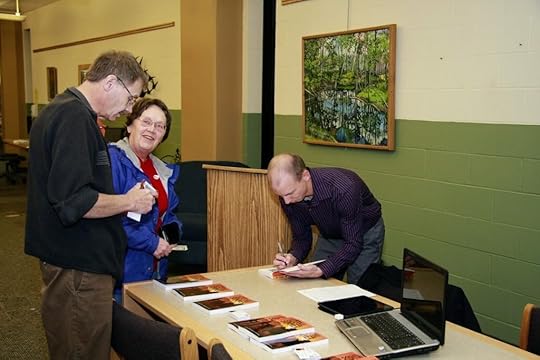 One of my first public speaking appearances. Signing copies of Thy Eternal Summer at Bethany Lutheran College in 2013.
One of my first public speaking appearances. Signing copies of Thy Eternal Summer at Bethany Lutheran College in 2013. I first sat down to write a novel in the summer of 2010 shortly after quitting my job as a parking lot attendant to focus on becoming an author. I had no background in fiction writing, and couldn’t fully comprehend the audacity of writing a novel with such limited experience. The result was predictable and all too common—a manuscript that couldn’t get published and probably never should be. Looking back, I understand that I was a bit naive to think I could write a novel. But for all the disadvantages of being naive, there is one overwhelming benefit: the freedom of not knowing any better. It’s this freedom that allows us to try things and to learn from our failures.
Now, almost fifteen years later, I’m currently working with two clients as a book coach. I’m working with another as a developmental editor. For another, I just completed a manuscript assessment. Someone else recently reached out to me asking if they could buy my editing services as a birthday present for their husband. And then there are all the manuscripts that I edit and finalize for publication with my company, History Through Fiction. As it turns out, my services as an editor are in high demand.
My path from naive author-in-training to bonafide book editor has been filled with a variety of very hard lessons. Some of those lessons were brought upon me intentionally through education and training, such as my Master of Fine Arts program in creative writing. Other lessons were brought upon me unexpectedly through the process of writing and publishing and receiving both solicited and unsolicited feedback for my work. Those moments when I received feedback were often difficult to understand and process. But looking back on them now, each one provided me with valuable insight that has accumulated over time—all of it contributing to my ability to recognize and evaluate the elements of fiction in not just my own work, but in the work of others.
While I have managed to acquire an understanding of how to utilize the craft elements of fiction to tell a story, my greatest asset as an editor is my experience as a writer and the empathy it has instilled within me. I know what it’s like to sit down and write a novel. I know what it’s like to put my work out there only to get rejected at every turn. I know what it’s like to receive the feedback of an editor, a mentor, a beta reader, a reviewer. I know what it’s like to receive both harsh and careless criticism, and constructive and gentle critiques. I know what it’s like to be naive enough to try.
Learning the craft of storytelling is not an easy task. Often, it takes years to put together all the elements of research, and character, and plot, and setting, until you have a readable 85,000-word manuscript, let alone a publishable novel. As a writer, I understand the process along with the vulnerability of putting yourself out there; of opening yourself up to criticism. It’s that experience as a writer that, more than anything else, allows me to be an effective editor. I understand how important it is to meet every writer where they are at, no matter where they are in the process of learning to write.
Every writer comes to me with their own set of skills, interests, and experience. Each of them has their own story behind the story they are trying to tell. As their editor, it’s not my job to judge their skill as a writer or lack thereof, it’s my job to help them make their story better. To do that, I have to rely on empathy. I must use my own experience to understand where they are at in the life-long process of learning to write, and assure them that they are on the right path. Once a writer understands that there is no endpoint, or Nirvana, or enlightenment; once they understand that they are always working toward something better, then they can put aside their passions, their doubts, their naivety, and just work to tell the story they wish to tell. That’s when craft becomes key and writers become authors.
Learn more about my editing services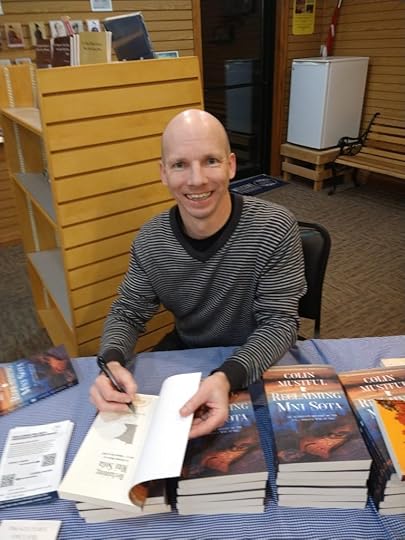
About the Author
Colin Mustful is a celebrated author and historian whose novel Reclaiming Mni Sota recently won the Midwest Book Award for Literary/Contemporary/Historical Fiction. With a Master of Arts in history and a Master of Fine Arts in creative writing, Mustful has penned five historical novels that delve into the complex eras of settler-colonialism and Native American displacement. He is also the founder and editor of History Through Fiction, an independent press dedicated to publishing historical narratives rooted in factual events and characters. Committed to bringing significant historical tales to light, Mustful collaborates with authors as a traditional and hybrid publisher. Residing in Minneapolis, Minnesota, he enjoys running, playing soccer, and believes deeply in the power of understanding history to shape a just and sustainable future.
July 20, 2024
Book Feature: “Where Wolves Don’t Die” by Anton Treuer
While I have not yet had a chance to read Where Wolves Don’t Die by Anton Treuer, the story intrigues me and I wanted to share it with my audience. A young adult novel, Where Wolves Don’t Die is set in Northeast Minneapolis, a place I have lived and worked in for many years. I also admire the author, Dr. Anton Treuer, an Ojibwe scholar and the author of many books, most of which are nonfiction. Once I’ve had the chance to read the novel, I’ll share my thoughts. For now, I’d just like to highlight it for you.
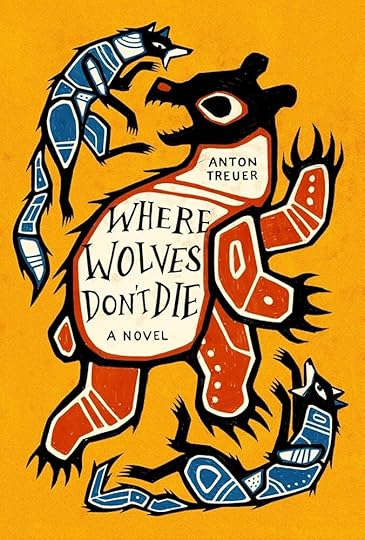
Synopsis
Ezra Cloud hates living in Northeast Minneapolis. His father is a professor of their language, Ojibwe, at a local college, so they have to be there. But Ezra hates the dirty, polluted snow around them. He hates being away from the rez at Nigigoonsiminikaaning First Nation. And he hates the local bully in his neighborhood, Matt Schroeder, who terrorizes Ezra and his friend Nora George.
Ezra gets into a terrible fight with Matt at school defending Nora, and that same night, Matt’s house burns down. Instantly, Ezra becomes a prime suspect. Knowing he won’t get a fair deal, and knowing his innocence, Ezra’s family sends him away to run traplines with his grandfather in a remote part of Canada, while the investigation is ongoing. But the Schroeders are looking for him…
From acclaimed author Anton Treuer comes a novel that’s both taut thriller and a raw, tender coming-of-age story, about one Ojibwe boy learning to love himself through the love of his family around him.
Praise
“Where Wolves Don’t Die will lift you up and not let you down. Anton Treuer knows how to tell a gripping story and the suspense doesn’t let up for a single page. Along the way you’ll learn about Ojibwe lifeways, languages, sharp jokes, gentle humor, and how to keep romantic love alive from youth to old age. I couldn’t put this book down until I’d finished it, and then, I could not forget it.”
–Louise Erdrich, Pulitzer Prize Winner and owner of Birchbark Books
“I am in awe, crying and smiling at the same time. Where Wolves Don’t Die is a love letter to our Ancestors. This beautiful story is full of cultural teachings and characters so familiar that I’m pretty sure we’re related.”
–Angeline Boulley, #1 NYT bestselling author of Firekeeper’s Daughter
“It is quite likely that I will never stop reading Where Wolves Don’t Die. First of all, it’s an excellent piece of writing, and second of all, each time that I would read through one section I would want to go back and read that section or another one over again. I enjoyed the writing so much because the author’s thoughts reflected mine in terms of what I knew my life to be and what I had hoped could have been. I think it is one of the best pieces of writing I have ever read.”
–The Hon. Senator Murray Sinclair, Chair of Canada’s Truth and Reconciliation Commission
Highlighted Review (Laurel on Goodreads)
Ezra is a thoughtful Ojibwe teenager growing up between the city and the a reservation. This first person narrative (read beautifully by the author) unfolds a story that has a mystery at the center but mostly is about Ezra figuring out how the world works – universal teenager stuff like being mad at your parents for things they can and can’t control, how to tell someone you have feelings for that you want to be more than friends, dealing with bullying, loss and grief, and homework.
And also the perspectives, traditions, beliefs, and experiences unique to being a Native American boy in modern society. Being part of a whole community who knows from centuries of violence and oppression of their people that they have no room for error in interacting with non-natives, that their brown skin and misunderstood culture subjects them to both child welfare involvement (rooted in state sanctioned kidnapping of whole generations of children) as well as police brutality and false arrest and conviction regardless of their culpability.
“Ezra, you’ll notice many kinds of moose in the woods…Moose can be dangerous. They are usually happy to eat lily pad roots and be left alone, but on the rare occasions when one attacks a human, it is not usually a big, mature, fully-antlered male who charges. The mostly likely moose to charge a person is a young bull, and that’s the moose who is most likely to be shot, or hit by the car. You see, Ezra, the moose is a metaphor for manhood. We often make our biggest mistakes when we are young. That’s when we are most likely to drive too fast and pay the price. To experiment with alcohol and drugs. To go on a date and not respect our partner. Or to hurt ourselves . If you want to live to be a big, mature, fully antlered bull, you have to act like one. You have to move a little slower and think before you act.”
All in all, it’s a beautiful story about connection and care set in a place and culture with such deep respect for nature and animals, a way of living with the earth with mutuality rather than depletion and exploitation. I would highly recommend it to YA as well as adult audiences.
Thank you to NetGalley for the chance to listen to and review this excellent audiobook.
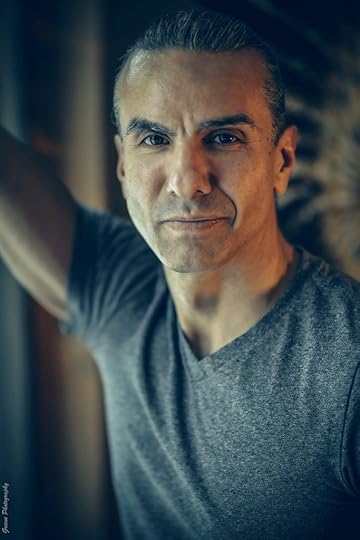
About the Author
Dr. Anton Treuer (pronounced troy-er) is Professor of Ojibwe at Bemidji State University and author of many books. His professional work in education, history, and Indigenous studies and long service as an officiant at Ojibwe tribal ceremonies have made him a consummate storyteller in the Ojibwe cultural tradition and a well-known public speaker. In 2018, he was named Guardian of Culture and Lifeways and recipient of the Pathfinder Award by the Association of Tribal Archives, Libraries, and Museums. Anton’s first book for young adults, Everything You Wanted to Know About Indians But Were Afraid to Ask (Young Readers Edition), won the SCBWI Golden Kite. This is his first novel.
June 11, 2024
Welcome to the Book Club Guide for Reclaiming Mni Sota
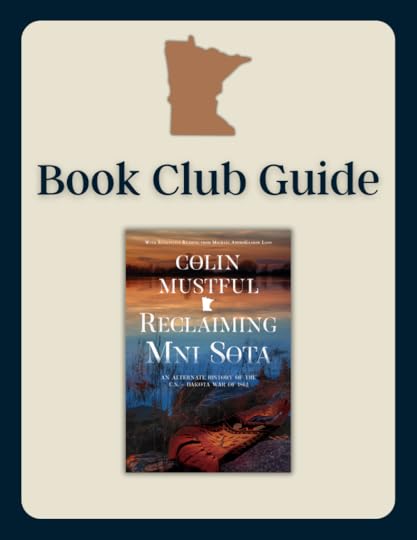
Are you ready to be immersed in a story that will not only captivate your imagination but also enrich your understanding of American history? Colin Mustful’s novel, Reclaiming Mni Sota, is an essential read for any book club seeking a story that intertwines the past with the present, challenging us to reflect on the complexities of our nation’s history.
As an author and historian, Mustful brings to life the heart-wrenching events of the U.S. – Dakota War of 1862 through vivid characters and a narrative that spans two perspectives. This isn’t just another historical novel; it’s a journey that asks us to consider the untold stories and the ‘what-ifs’ of history. By choosing Reclaiming Mni Sota for your book club, you’re not just picking a book—you’re embracing an opportunity to explore deep moral questions and engage in meaningful discussions about culture, identity, and the legacy of the past.
Mustful’s dedication to authenticity shines through his work, as he navigates the delicate task of representing Native voices with respect and sensitivity. His dual narratives offer a balanced view of a tumultuous time, making this novel a powerful tool for empathy and understanding.
So, gather your fellow readers, open your minds, and prepare to be transported to a time of conflict and change. Reclaiming Mni Sota promises to be a book club selection that sparks conversation, fosters insight, and remains with you long after the final page is turned.
Download the Book Club GuideAbout the Novel
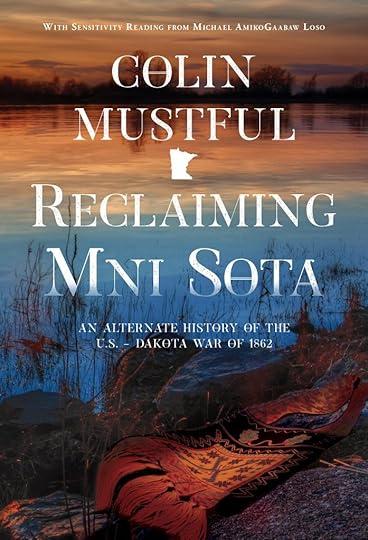
Two cultures met in Minnesota—one striving to maintain its homeland and traditions, another trying to create a life of freedom, prosperity, and abundance.
Samuel Copeland was just a teenager in 1859 when he and his family left Vermont for the promise of a new life in Minnesota. But life is harder and more dangerous than he expected. Devastated by the loss of his father at the hands of Indians and seeking to protect his brother, Samuel joins the Union army believing he’d be safe on the frontier. WaabiskiMakwa was still a boy in 1850 when his father perished at Sandy Lake because of the negligence of U.S. government officials. Seeing his way of life crumbling around him, WaabiskiMakwa leaves his home to mourn his father and seek a new way, one that includes his lost-love, Agnes. Seeking their own solutions, neither Waabi or Samuel could see the collision course their paths had been set upon by a world in conflict. War was in their future and it was inevitable. But when war breaks out, and their cultures collide, so do their individual paths. Though they can’t stop the war, maybe they can help each other.
Fueled by years of mistreatment and seeing the opportunity provided by the War with the South, Dakota spokesman Little Crow and Ojibwe leader Bagone-giizhig, join forces in an effort to reclaim their Native lands. Spurred by early victories over Fort Ridgley and New Ulm, the Dakota-Ojibwe Alliance heads north to Fort Snelling, the beacon of American strength in the region. Once thought impenetrable, the fort and its small group of volunteer militia fights to hang on when a new enemy arrives from the West.
In Reclaiming Mni Sota, the true and lasting results of history are challenged. Acting as individuals, striving to protect ourselves and our families, it’s impossible to understand our role and impact in the much larger march of time. The United States is an abundant, beautiful land filled with wealth and opportunity, but its history is scarred by inequity and loss. What if the defeated became the victors? What would that mean for the world today and how would that illuminate the wrongs of the past?
May 14, 2024
Minnesota’s Forgotten Path: How the Doty Treaty Shaped the State
“In short, it was designed to create of the Sioux country a second Indian Territory, into which to dump all the odds and ends of Indian tribes still left east of the Mississippi.”
– Thomas Hughes
Decades before Minnesota became the 32nd state of the Union, there was a push among Jacksonian-era U.S. policy makers to create an “all-Indian” territory in the northern region. Prior to large scale white settlement, it was believed that Minnesota’s winters were too long and its growing season too short to profitably sustain agriculture. The only other option to profit from the area was through Indian treaty and reservation system.
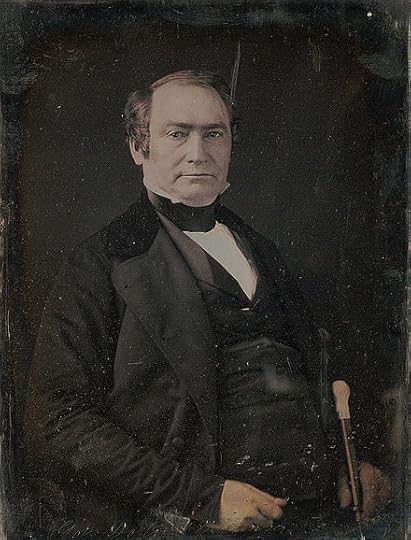 The governor of Wisconsin Territory, James D. Doty, was the architect of a treaty that would create an “all-Indian” territory.
The governor of Wisconsin Territory, James D. Doty, was the architect of a treaty that would create an “all-Indian” territory. Although reformers had been advocating for an all-Indian territory for many years, it wasn’t until Thomas Hartley Crawford became the Commissioner of Indian Affairs in 1838 that major steps to implement the policy were made. Crawford stated that he wanted to buy land between Iowa and Minnesota to become “a region hemmed in by the laws of the United states, and guarded by virtuous agents, where abstinence from vice, and the practice of good morals, should find fit aboded in comfortable dwellings and cleared farms, and be nourished and fostered by all the associations of the hearthstone.” Crawford was supported in this notion by Secretary of War John Bell who wished to move some 50,000 Great Lakes Indians into the new territory. To accomplish this, Crawford and Bell enlisted the services of James D. Doty, governor of Wisconsin Territory at the time. Doty, in turn, enlisted the services of Henry H. Sibley, a fur trader with influential connections among the Dakota people. Sibley and the fur traders had a strong interest in creating an all-Indian territory as a sort of fur trade preserve. Additionally, the sale of land from a potential treaty would settle their debts, helping many fur traders stave off bankruptcy.
Doty and Sibley immediately went to work putting together a treaty. According to the treaty, the U.S. government would purchase the lands east of the Mississippi, west of the Couteau des Prairie, north of the Neutral Ground, and south of the Crow Wing River. Then, this land would be used as a permanent settlement (the Dakotas were assured permanent exclusion of settlers from the proposed territory) for the northwest tribes where they would receive annuities and federal investment in schools, doctors, blacksmiths, livestock, seed, tools, roads, and other necessities for creating an agricultural society. Additionally, the treaty stipulated that the tribes within the territory were to have a constitutional form of government, with a legislative body elected by themselves and a governor appointed by the general government. Finally, it provided that those Indians who chose the farmer’s assimilationist path would become eligible for U.S. citizenship.
Called the Doty Treaty, it was signed at Traverse des Sioux by Sisseton, Wahpeton, and Wahpekute bands of Dakota on July 31, 1841, and at Mendota by the Mdewakanton on August 11, 1841. However, it should be noted that several of the major chiefs were absent from negotiations. Furthermore, tribes such as the Sac and Fox and Ho-Chunk, who were belatedly consulted, refused to remove to the new territory.
It would not matter, however, whether or not the tribes agreed to remove to the new territory, because on August 29, 1842, the treaty failed confirmation in the Senate by a vote of 26 to 2. Opponents of the treaty, mostly Democrats and Whigs, feared the idea of an independent Indian state, especially one with the potential to grant citizenship to Native peoples. The treaty also went against the views of expansionists who believed that all land was set apart for the expansion of the United States and its white settler population.
The rejection of the Doty Treaty played a huge role in the development of the United States and the creation of Minnesota as a state. Although the treaty failed, it set the stage for the treaties of Traverse des Sioux and Mendota ten years later. The fur traders, having lost out in 1841, were clamoring for a new treaty in 1851. And, once the land was ceded by the 1851 treaties, it opened the way for white settlement and eventually statehood in 1858. It also created the extremely detrimental conditions for the Dakota that would be a major cause of the U.S. – Dakota War. Ultimately, whether or not an all-Indian territory was created is probably beside the point. The U.S. was determined to subjugate and remove Native populations for the benefit of its white population. No matter what happened, the final results were always going to be the same, ensuring the benefits of some and detriment of others.
Sources:
Mary Lethert Wingerd, North Country: The Making of Minnesota, (Minneapolis, MN: University of Minnesota Press, 2010).
Thomas Hughes, “The Treaty of Traverse des Sioux in 1851, Under Governor Alexander Ramsey, with Notes of the Former Treaty There, In 1841, Under Governor James D. Doty, of Wisconsin,” in Collections of the Minnesota Historical Society, Vol. 10, Part 1 (St. Paul, Minn: Published by the Society, 1905), pages 101 – 129.
Jordon Scott Bergstrom, The Rise and Fall of the Minnesota Middle Ground: Henry Hastings Sibley and the Ethnic Cleansing of Minnesota, Master Theses, Spring 2015, Central Washington University, https://digitalcommons.cwu.edu/cgi/viewcontent.cgi?referer=&httpsredir=1&article=1157&context=etd

About the Author
Colin Mustful is an independent historian, author, and publisher. His work, which includes five historical novels, focuses on the tumultuous and complicated periods of settler-colonialism and Native displacement in American history. He has a Master of Arts degree in history and a Master of Fine Arts degree in creative writing. He is the founder and editor of History Through Fiction, an independent press that publishes compelling historical novels that are based on real events and people. As a traditional publisher, he works with authors who want to share important historical stories with the world. Mustful is an avid runner and soccer player who lives in Minneapolis, Minnesota. He believes that learning history is vital to understanding our world today and finding just, long-lasting solutions for the future.
May 3, 2024
Press Release – Reclaiming Mni Sota named a finalist for the 34th annual Midwest Book Awards
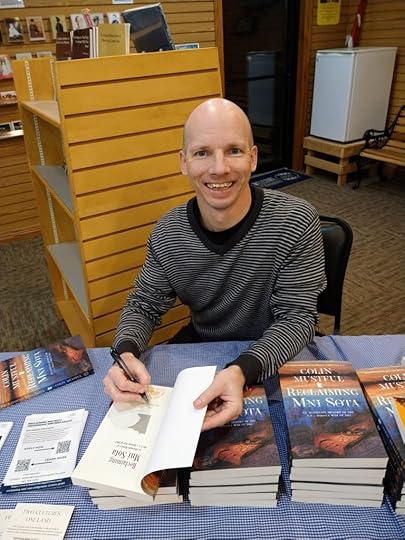
FOR IMMEDIATE RELEASE
Contact: Colin Mustful
mnauthor@colinmustful.com
Colin Mustful honored as Midwest Book Awards finalist for novel that provides a creative reimagining of the U.S. – Dakota War of 1862
Minneapolis, MN – May 3, 2024 – Author Colin Mustful was recognized in the category of Fiction – Literary/Contemporary/Historical in the 34th annual Midwest Book Awards.
Told as a dual narrative between the perspectives of Waabi, an Ojibwe boy, and Samuel, a white settler-colonialist, Reclaiming Mni Sota challenges our perspectives of history by asking readers: What if the defeated became the victors? What would that mean for the world today and how would that illuminate the wrongs of the past? Reclaiming Mni Sota is Mustful’s fifth novel and his first alternate history. It was published by his own independent literary press, History Through Fiction. A graduate of Minnesota State University, Mankato, Mustful first began studying and writing about the U.S. – Dakota War after visiting Reconciliation Park, a memorial acknowledging the tragic hanging of thirty-eight Dakota men there on December 26, 1862. Through his historical narratives, Mustful confronts America’s history of settler-colonialism while illuminating the personal stories and heartrending choices that men and women, white and Native, were forced to make.
Gold winners will be announced in person at the Midwest Book Awards gala held on June 22, 2024 at the Mall of America in Minneapolis. Mustful’s novel is being recognized alongside Up There by Sherry Roberts (Osmyrrah Publishing) and Power & Light by Will Weaver (Calumet Editions).
The Midwest Book Awards are presented by the Midwest Independent Publishers Association, a non-profit organization dedicated to supporting independent publishers in the Midwest. The awards are open to all books published in the Midwest in the previous year.
MiPA founders organized the first Midwest Book Awards in 1989, and today the Midwest Book Awards is one of the longest running literary recognition programs in the country. Judges for the prestigious literary program are booksellers, university staff, and librarians who are subject matter experts and collectively hail from each of MiPA’s twelve states.
View all finalists at https://mipa.org/midwest-book-awards/2024-finalists/
The June 22, 2024 event is open to the public. Find out more at www.mipa.org/bookawards.
###



